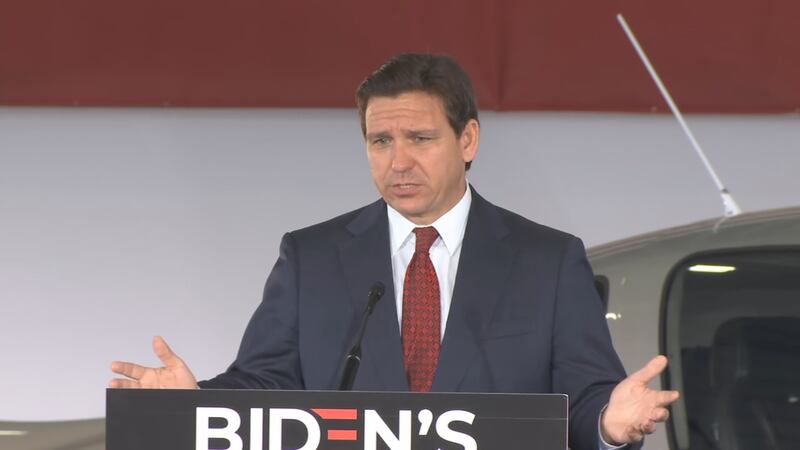ORLANDO, Fla. — Florida’s 2023 legislative session begins Tuesday.
>>> STREAM CHANNEL 9 EYEWITNESS NEWS LIVE <<<
Read nine key issues legislators will take on below:
- Gun rights: A major priority for Speaker of the Florida House Paul Renner (R-Palm Coast) is permitless carry. The bill (HB 543) would allow a person to carry a concealed weapon in public without going through the current steps of background checks, fingerprints, taking a safety course or paying a fee to the state. Many groups had been pushing for open carry, however, amid pushback from law enforcement organizations, the bill only allows for permitless carry.
- School voucher expansion: The state is eyeing an expansion of its school choice measures, specifically the measure would increase the number of students eligible for vouchers to attend private schools. Florida currently offers four programs for families to send their kids to private schools. Under HB-1, two of those programs -- the Florida Tax Credit scholarship and the Family Empowerment Scholarship -- would be expanded to every K-12 student in the state whose household income does not exceed 185% of the federal poverty level. There is also a plan (HJR 31) to make school board elections partisan. This would be a proposed constitutional amendment and would need approval from 60% of voters.
- U.S. Supreme Court challenges: Several bills have been filed with language designed to draw a legal challenge. State Sen. Jason Brodeur (R-Seminole County) has filed a bill (SB 1316) that would require bloggers to register and report to the state if they blog about the governor, lieutenant governor, CFO, attorney general, agriculture commissioner or the Florida Legislature. Another bill filed by State Rep. Alex Andrade (R-Pensacola) would make changes to Florida libel and defamation laws (HB 991). Both bills would face significant First Amendment challenges and end up before the U.S. Supreme Court.
- Homeowner’s insurance problems: Florida Gov. Ron DeSantis has already called for two special sessions to deal with the state’s failing homeowner’s insurance market, but lawmakers are poised to tackle the issue again in the regular session. At present, 10 carriers have gone into liquidation, the state-backed Citizens Property Insurance is headed toward 1.5 million policies, and rates are expected to increase by as much as 50% this year. On Friday, State Rep. Spencer Roach (R-Fort Myers) tweeted out a picture of his insurance cancellation notice while writing, “We must do more to address this.” It is unclear if the state will take additional steps in this session or wait to see if its work from 2022 starts to have an impact. However, with cancelation notices and premium increases going out, there will be pressure to do more.
- Death penalty changes: In 2016, the U.S. Supreme Court threw out the state’s death penalty system which had allowed judges to impose the death penalty as long as a majority of the jury had recommended death. In response, the Florida Legislature passed a law, allowing the death penalty in 10-2 decisions. But the Florida Supreme Court threw out that law, saying decisions had to be unanimous. In 2022, the jury in the trial of the Parkland school shooter delivered a 9-3 decision, prompting lawmakers to call on the state to rewrite the law again. The plan before lawmakers would allow for the death penalty as long as eight jurors recommend death. Of the 27 states that use the death penalty, only three do not require a unanimous decision.
- Consolidate power in Tallahassee: Preemption is back on the table with several bills filed to strip local governments of power, including one measure to prohibit counties and municipalities from regulating water quality and pollution (SB 1240). Another bill filed by State Sen. Blaise Ingoglia (R-Hernando County) would restrict how much power local municipalities have to regulate recycling and solid waste (SB 798).
- Lawsuits against insurance companies: In 2022, lawmakers took aim at Florida’s one-way attorney’s fees provision in an attempt to stabilize the crumbling property insurance market. Now the state is eyeing an expansion of this by eliminating one-way attorney’s fees from other insurance lawsuits (HB 837). The bill would provide that a “contingency fee multiplier for an attorney fee award is appropriate only in a rare and exceptional circumstance, adopting the federal standard,” and “repeals Florida’s one-way attorney’s fee provisions for insurance cases.” Proponents of the bill say it will reduce bad faith lawsuits and better protect businesses. But critics say it will insulate insurance companies by preventing people from being able to bring forth litigation.
- Transgender issues: After passing laws dealing with transgender athletes and other issues, the state is once again introducing bills to target transgender youth, including a bill from State Rep. Randy Fine (R-Palm Bay) to prohibit treatments for transgender youth (HB 1421) while also banning the use of tax dollars for adult procedures. Additionally, a bill (HB 1223) filed by State Rep. Adam Anderson (R-Tarpon Springs) would require K-12 schools to use the pronouns of a student’s gender at birth.
- Abortion restrictions: Right now, Florida’s 15-week abortion ban is headed to the Florida Supreme Court. Depending on how the court rules, lawmakers could move to further limit abortion access in the state, reducing the number of weeks to six, like Georgia, or to ban the procedure entirely. Both DeSantis and Renner have indicated they would support additional restrictions.
Click here to download the free WFTV news and weather apps, click here to download the WFTV Now app for your smart TV and click here to stream Channel 9 Eyewitness News live.
©2023 Cox Media Group





